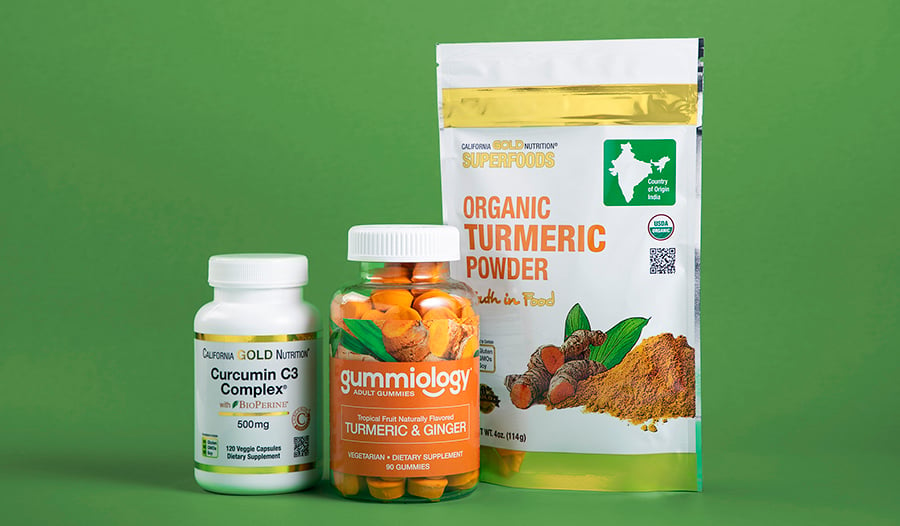Top 5 Turmeric Benefits: Skin, Joints + Brain Health (MD Reviewed)

Key Takeaways
- Active Ingredient: The primary compound in turmeric is curcumin, known for its powerful anti-inflammatory and antioxidant properties.
- Joint Pain Relief: Studies show turmeric may be as effective as some prescription drugs for managing arthritis pain by suppressing inflammation markers like COX-2.
- Skin Health: Turmeric may help fight acne bacteria, fade dark spots (hyperpigmentation), and protect against UV-induced aging.
- Brain + Mood: Curcumin may boost memory and improve symptoms of depression by increasing serotonin and dopamine.
- Safety + Dosage: A common dosage is 500 mg taken 1–4 times daily. Always consult a doctor if you are on blood thinners or diabetes medication.
What Is Turmeric?
Turmeric is one of the most consumed herbs around the world, likely due to its perceived health benefits. Also known as curcuma longa and Indian saffron, turmeric has been used for thousands of years in Ayurvedic and Traditional Chinese Medicine for its anti-inflammatory, antioxidant, and digestive health properties. It is also now becoming popular among non-traditional healers—including physicians who practice Western medicine.
Turmeric vs. Curcumin
Curcumin, the active ingredient found in turmeric, was first isolated in 1815 by German scientists Vogel and Pelletier. While many people have used turmeric as a spice to enhance their food for over the past 4,000 years, today its use continues to be researched as an alternative treatment approach for many common sicknesses, injuries, and chronic diseases such as rheumatism and neurological issues like memory preservation.
Over the last few years, I have recommended turmeric to patients as a first-line approach for joint inflammation or arthritis. The results have been great. Many patients have reported to me that they have been able to reduce their need for prescription anti-inflammatory drugs and, in some cases, opiate medications.
Traditional Chinese Medicine’s use of turmeric or jiang huang involved its perceived effect of being able to move a person’s “qi” or vital energy. Additionally, people believe turmeric improves blood flow, alleviates abdominal pain, and helps restore disrupted menstrual cycles, also known as amenorrhea. Though its mechanism of action in these cases has yet to be confirmed, the tradition of using turmeric for these purposes continues to live on.
How Does Turmeric Work?
While we already know the active ingredient in the spice turmeric is curcumin, it appears that turmeric has numerous mechanisms of action, which explains why it has been used for an array of medical problems for so long. Scientific studies have shown that, at the molecular level, curcumin has anti-inflammatory activity and acts by suppressing numerous cellular pathways, including STAT3, Nrf2, RO, NF-κB (Nuclear Factor Kappa B), and COX-2. The latter two are common targets of pharmaceutical drugs such as non-steroidal (ibuprofen, diclofenac, naproxen, etc) and steroids (prednisone, methyl-prednisolone). Many anti-tumor drugs also target NF-κB.
Top 5 Health Conditions That May Benefit From Turmeric
Arthritis
Arthritis, inflammation of the joints, is a condition that has affected humans since the beginning of time. Worldwide, over 500 million are affected — the most common types of arthritis are osteoarthritis (~95%) and rheumatoid arthritis (~5%). Before the advent of modern pharmaceuticals, those who were afflicted did not simply suffer endlessly from pain, but rather, they utilized nature’s herbs and organic foods to help minimize aches and discomforts. Today, as more people become concerned about the side effects of prescription drugs, many are seeking safer alternatives.
A July 2021 study evaluated turmeric versus a placebo for arthritis discomfort. The researchers concluded that turmeric did a better job in controlling pain while improving function more effectively than a placebo in those with knee arthritis. Another study from the same year also specifically evaluated knee arthritis and showed that turmeric reduced inflammation by suppressing inflammatory chemicals.
Studies also show turmeric to be helpful in reducing pain for both rheumatoid and osteoarthritis. Scientists have discovered that turmeric can reduce inflammation similarly to multiple blockbuster prescription drugs. This herb can modify NF-κB signaling and reduce pro-inflammatory, which can cause a person to have arthritis pain. These chemicals are called COX-2 and 5-LOX.
In addition to curcumin supplements being helpful for arthritis pain, learn more about other natural treatments of arthritis.
Acne + Oxidative Damage
Oxidative damage is the main process by which our bodies age and ultimately become damaged. Examples of oxidation include the browning of an air-exposed apple or banana left on the kitchen counter. The rusting of a steel bumper, when exposed to the elements, is also an instance of oxidation. Oxidative damage can be caused by the sun, air, sugar, processed foods, and toxic chemicals. Fruits and vegetables, which are highly concentrated with phytochemicals (plant chemicals), provide our bodies with protective antioxidants.
Oxidative stress from the sun (UV radiation) and pollution is a primary cause of premature aging, such as fine lines and sagging. As a powerful antioxidant, turmeric helps neutralize free radicals that damage skin cells. Furthermore, research indicates that curcumin may inhibit matrix metalloproteinases (MMPs)—enzymes that break down collagen—thereby helping to maintain skin elasticity and firmness.
While most people associate turmeric with joint health or digestive support, this golden spice is rapidly becoming a staple in the world of dermatology. Research suggests that curcumin—turmeric’s active compound—may offer significant benefits for skin health due to its potent anti-inflammatory, antimicrobial, and antioxidant properties.
Acne is largely driven by inflammation and bacteria (Cutibacterium acnes). Turmeric may help combat both. A 2013 study suggested that curcumin can inhibit the growth of acne-causing bacteria. Additionally, its strong anti-inflammatory nature helps calm the redness and swelling associated with active breakouts, potentially speeding up the healing process and reducing the risk of scarring.
Asthma
Asthma is a common respiratory condition among children and adults. It is defined as a chronic and reversible obstructive airway disease that normally responds to albuterol medication therapy. Fortunately, if the cause is determined and the condition is correctly diagnosed, asthma can be treated successfully. Despite our ability to control asthma symptoms, preventing attacks is also very important. Curcumin appears to play an important role.
A 2010 study demonstrated improved management of bronchial asthma with the use of turmeric when consumed with Boswellia serrata and licorice root. The results showed greater prevention of excessive swelling and mucous production associated with asthma, reducing inflammation, and increasing antioxidant properties.
A 2014 study in the Journal of Clinical and Diagnostic Research also concluded that turmeric, when taken orally, could help improve lung function in those with asthma.
Further, a 2019 study showed that turmeric could not only help reduce inflammation in the airways but also reduce mucous secretion. Curcumin’s potential benefit in reducing lung inflammation in treating those with asthma was also demonstrated in a 2018 study.
Depression
Depressive disorder affects millions of people worldwide. The causes can be complex, stemming from a combination of social stresses and biochemical imbalance. Symptoms include a desire to sleep, decreased interest in activities, feelings of guilt, trouble concentrating, moving slowly, and sometimes, thoughts of self-harm. When present, seeking the assistance of a healthcare professional is crucial.
Many look for natural alternatives to help with depression. A 2008 study showed that turmeric could help increase both serotonin and dopamine levels, providing the mechanism by which it could be helpful in the treatment of depression. In this study, they also utilized piperine, which provided a synergistic effect.
A meta-analysis study from 2020 screened 930 studies and included nine in their final analysis. The researchers observed that curcumin was generally well-tolerated and, if added to standard care, might improve depressive and anxiety symptoms in those with depression. However, they warned that due to their small sample size, their results should be “cautiously interpreted.”
Memory Loss
There are many types of dementia. Alzheimer’s disease, a brain disorder that generally affects older adults, is the most common. Memory loss, confusion, and difficulty understanding common interactions are some of the most prevalent symptoms of this progressive and devastating condition.
When it comes to brain health, Dr. Dale Bredesen of the University of California, Los Angeles, and author of the 2017 book The End of Alzheimer’s, considers turmeric an important part of improving symptoms of dementia and Alzheimer’s. Many scientific studies show proof of its usefulness. One study showed that turmeric may play a role in decreasing amyloid plaque buildup in the brain, the accumulation of which is believed to be the cause of Alzheimer’s disease.
Another study from 2017 in the Journal of Alzheimer’s Disease concluded that turmeric could play an important role in preventing memory loss. There is much excitement surrounding turmeric’s possible role in preventing mild cognitive impairment and, ultimately, Alzheimer’s disease. It should be considered an essential supplement for anyone wanting to optimize memory.
A 2018 study separated 40 people without dementia into two groups. Twenty were given turmeric, while the other 20 were given a placebo supplement. The subjects were followed for 18 months, with researchers concluding that turmeric improved memory in those with no cognitive impairment. The participants then underwent a brain scan (FDDNP-PET), which further showed that turmeric also reduced the deposition of the proteins in the brain (amyloid and tau) that are associated with dementia.
Other conditions that turmeric may help with, according to studies, include:
- Ulcerative colitis (colon inflammation)
- Diabetes
- High blood pressure
- Stomach ulcers caused by the H. pylori bacteria
- Indigestion
- Prevention of gallstones
- Atherosclerosis and heart disease
- Removing mercury from the body
Turmeric Drug Interactions
Because of the potential to interact with certain medications, please speak with your doctor first to determine if the consumption of turmeric or its derivative curcumin is the right choice for you. The following are possible drug interactions:
- Turmeric and diabetes medications may result in an increased risk of low blood sugar or hypoglycemia. While turmeric may potentially reduce the need for diabetic medications, do not stop diabetic medications without first consulting with your physician.
- Turmeric and blood thinners may interact. When turmeric and drugs such as clopidogrel (Plavix) or warfarin (Coumadin) are combined, there may be a small increased risk for bleeding. Consult with your doctor prior to taking them together.
Recommended Doses
Many people consume turmeric by drinking it in tea form, using it as a powder for some skin conditions, and also swallowing it in capsule form. Curcumin/turmeric supplements are usually taken at doses of 500 mg daily or 500 mg up to three to four times per day.
References:
- Int J Mol Sci. 2021 Jul 16;22(14):7645.
- Rachel Groff, Meghan Strom, Laura Hopkins, Lena Feng, Allison Hopkins and Janet Funk. Dietary Supplements and Nutritional Approaches Used for Rheumatoid Arthritis Self-Management April 2017. The FASEB Journal vol. 31 no. 1 Supplement lb396
- Daily JW, Yang M, Park S. Efficacy of Turmeric Extracts and Curcumin for Alleviating the Symptoms of Joint Arthritis: A Systematic Review and Meta-Analysis of Randomized Clinical Trials. Journal of Medicinal Food. 2016;19(8):717-729.
- Griffiths K, Aggarwal BB, Singh RB, Buttar HS, Wilson D, De Meester F. Food Antioxidants and Their Anti-Inflammatory Properties: A Potential Role in Cardiovascular Diseases and Cancer Prevention. Battino M, ed. Diseases. 2016;4(3):28.
- Houssen ME, Ragab A, Mesbah A, El-Samanoudy AZ, Othman G, Moustafa AF, Badria FA. Natural anti-inflammatory products and leukotriene inhibitors as complementary therapy for bronchial asthma. Clin Biochem. 2010 Jul;43(10-11):887-90.
- Abidi A, Gupta S, Agarwal M, Bhalla HL, Saluja M. Evaluation of Efficacy of Curcumin as an Add-on therapy in Patients of Bronchial Asthma. Journal of Clinical and Diagnostic Research : JCDR. 2014;8(8):HC19-HC24.
- Mediators Inflammation. 2019 Apr 3;2019:4927430.
- Colloids Surf B Biointerfaces . 2018 Dec 1;172:51-59.
- Kulkarni, S.K., Bhutani, M.K. & Bishnoi, M. Antidepressant activity of curcumin: involvement of serotonin and dopamine system. Psychopharmacology 201, 435 (2008).
- Sanmukhani J, Satodia V, Trivedi J, Patel T, Tiwari D, Panchal B, Goel A, Tripathi CB. Efficacy and safety of curcumin in major depressive disorder: a randomized controlled trial. Phytother Res. 2014 Apr;28(4):579-85
- Critical Rev Food Science Nutrition. 2020;60(15):2643-2653.
- Journal of Alzheimer's Disease, vol. 55, no. 2, pp. 797-811, 2017
- J Alzheimers Dis. 2017;60(2):451-460.
- Small GW, Siddarth P, Li Z, Miller KJ, Ercoli L, Emerson ND, et. al. Memory and Brain Amyloid and Tau Effects of a Bioavailable Form of Curcumin in Non-Demented Adults: A Double-Blind, Placebo-Controlled 18-Month Trial. Am J Geriatr Psychiatry. 2018 Mar;26(3):266-277.
- Karthikeyan A, Young KN, Moniruzzaman M, et al. Curcumin and Its Modified Formulations on Inflammatory Bowel Disease (IBD): The Story So Far and Future Outlook. Pharmaceutics. 2021;13(4):484. Published 2021 Apr 2.
- Pivari F, Mingione A, Brasacchio C, Soldati L. Curcumin and Type 2 Diabetes Mellitus: Prevention and Treatment. Nutrients. 2019;11(8):1837. Published 2019 Aug 8.
- Kim HR, Kim WK, Ha AW. Effects of Phytochemicals on Blood Pressure and Neuroprotection Mediated Via Brain Renin-Angiotensin System. Nutrients. 2019;11(11):2761. Published 2019 Nov 14.
- Sarkar A, De R, Mukhopadhyay AK. Curcumin as a potential therapeutic candidate for Helicobacter pylori associated diseases. World Journal of Gastroenterology. 2016;22(9):2736-2748.
- Li Y, Li M, Wu S, Tian Y. Combination of curcumin and piperine prevents formation of gallstones in C57BL6 mice fed on lithogenic diet: whether NPC1L1/SREBP2 participates in this process? Lipids in Health and Disease. 2015;14:100.
- J Appl Toxicol. 2010 Jul;30(5):457-68.
- Heshmati J, Moini A, Sepidarkish M, et. al. Effects of curcumin supplementation on blood glucose, insulin resistance and androgens in patients with polycystic ovary syndrome: A randomized double-blind placebo-controlled clinical trial. Phytomedicine. 2021 Jan;80:153395.
- Vaughn AR, Branum A, Sivamani RK. "Effects of Turmeric (Curcuma longa) on Skin Health: A Systematic Review of the Clinical Evidence." Phytotherapy Research. 2016 Aug;30(8):1243-64. (Review confirming benefits for acne, photoaging, and facial redness).
- Tu CX, et al. "Curcumin inhibits melanogenesis in human melanocytes." Phytotherapy Research. 2012;26(2):174-179. (Study demonstrating the skin-brightening mechanism of tyrosinase inhibition).
- Thangapazham RL, Sharma A, Maheshwari RK. "Beneficial role of curcumin in skin diseases." Advances in Experimental Medicine and Biology. 2007;595:343-57. (Overview of wound healing and anti-inflammatory skin properties).
- Sikora E, Scapagnini G, Barbagallo M. "Curcumin, inflammation, ageing and age-related diseases." Immunity & Ageing. 2010;7:1. (Discusses antioxidant pathways relevant to anti-aging).
DISCLAIMER:This Wellness Hub does not intend to provide diagnosis...
















































































 Table of Contents
Table of Contents
















